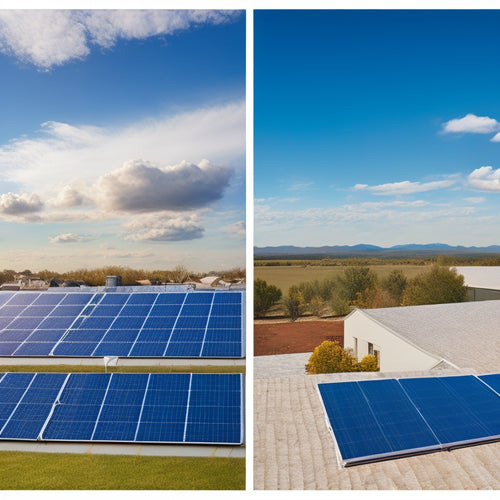
Top Solar Energy Savings for Small Businesses
Share
By incorporating solar energy into your existing systems, you can cut your electricity bills by up to 50% and redirect resources towards business growth and profitability. Energy audits and building retrofits help maximize the benefits of solar energy, leading to significant savings on energy bills. You can also reduce operational expenditures by 20-30%, improving cash flow management and increasing profitability. Federal and local incentives, such as the Solar Investment Tax Credit, can further offset the cost of going solar. Discover how to tap into these savings and more, and take the first step towards a more sustainable and cost-effective future for your small business.
Key Takeaways
• Integrating solar energy can lead to energy efficiency savings of up to 50% on electricity bills for small businesses.
• Energy Audits identify areas of inefficiency, optimizing energy usage and maximizing solar energy benefits.
• Building Retrofits upgrade infrastructure, leading to significant energy bill savings and increased profitability.
• Solar energy solutions can reduce operational expenditures by 20-30%, improving cash flow management and profitability.
• Predictable energy expenses are achieved through solar energy, allowing for better resource allocation and financial sustainability.
Unlocking Energy Efficiency Savings
By integrating solar energy into your existing system, you can tap into energy efficiency savings of up to 50% on your electricity bills.
This significant reduction is achievable through a combination of Energy Audits and Building Retrofits.
An Energy Audit is a thorough assessment of your building's energy usage, identifying areas of inefficiency and opportunities for improvement.
This vital step helps you understand your energy consumption patterns and pinpoint areas where solar energy can make the most impact.
Once you've identified the areas for improvement, Building Retrofits come into play.
These retrofits involve upgrading your building's infrastructure to optimize energy efficiency.
This might involve installing new insulation, windows, or lighting systems that work in harmony with your solar energy system.
By retrofitting your building, you'll be able to maximize the benefits of solar energy and enjoy significant savings on your energy bills.
Reducing Operational Expenditures Fast
As you implement solar energy solutions, your operational expenditures plummet, freeing up resources to fuel business growth and profitability. By harnessing the power of the sun, you can drastically reduce your energy costs, which can account for a substantial portion of your operational expenses. This cost-cutting measure can have a direct impact on your bottom line, allowing you to allocate resources more effectively.
| Energy Cost Savings | Expense Management | Cost Cutting Benefits |
|---|---|---|
| 20-30% reduction in energy costs | Improved cash flow management | Increased profitability |
| Reduced reliance on grid electricity | Enhanced budgeting and forecasting | Competitive advantage in the market |
| Predictable energy expenses | Better resource allocation | Improved financial sustainability |
Federal Solar Investment Tax Credit
As you explore the Federal Solar Investment Tax Credit, you'll want to understand how to claim the credit, what eligible expenses are covered, and the timeframe for submitting your claim.
You'll need to know the specifics of the credit to maximize your savings.
Claiming the Credit
You're eligible to claim the Federal Solar Investment Tax Credit (ITC) if you've installed a solar energy system in your home or business, and you're willing to take the necessary steps to navigate the application process.
As a small business owner, it's vital to understand the tax benefits that come with the ITC. By claiming the credit, you can reduce your tax liability, freeing up cash flow for other business expenses.
However, it's key to be aware of potential audit risks associated with claiming the ITC. To minimize these risks, verify that you maintain accurate and detailed records of your solar energy system installation, including receipts, invoices, and certification documents.
A thorough understanding of the ITC's nuances will help you navigate the application process with confidence and maximize your tax benefits. By doing so, you'll be able to reap the rewards of going solar while minimizing potential audit risks.
Eligible Expenses
To maximize your Federal Solar Investment Tax Credit, it's vital to understand what expenses qualify, including the cost of solar panels, inverters, mounting hardware, and installation labor. These eligible expenses can substantially impact the overall credit amount you can claim.
Some key expense categories to keep in mind:
Equipment Costs: This includes the cost of solar panels, inverters, and mounting hardware.
Installation Costs: Labor costs associated with installing the solar equipment, including permits and inspections.
Engineering and Design Costs: Costs related to designing and engineering your solar energy system.
Other Soft Costs: Expenses like site preparation, wiring, and electrical upgrades.
Accurate categorization and documentation of these expenses are vital to take full advantage of the credit. Bear in mind that improper documentation or incorrect categorization can trigger Audit Procedures, resulting in delays or even credit disallowances.
Claim Period
You'll need to claim the Federal Solar Investment Tax Credit within a specific timeframe, known as the claim period, which begins when your solar energy system is placed in service.
This is a vital step in securing the tax credit, and key to understanding the time constraints involved. The claim period typically spans multiple years, but it's imperative to file your claim within the designated filing deadlines to avoid missing out on this valuable incentive.
As a small business owner, you'll need to keep track of the clock, ensuring you meet the necessary deadlines to claim your credit.
The IRS sets specific filing deadlines, and failure to meet these deadlines can result in forfeiting your claim. To avoid this, mark your calendar and prioritize filing your claim within the allotted timeframe.
State and Local Incentives Available
As you explore state and local incentives for solar energy, you'll find that many governments offer additional benefits to encourage adoption.
You may be eligible for local tax credits, which can substantially reduce your tax liability.
Additionally, utility rebate programs can provide upfront savings on your solar panel installation, making it more affordable to go solar.
Local Tax Credits
Your state and local governments offer various tax credits that can substantially reduce the cost of going solar, making it more accessible and financially beneficial for you. By taking advantage of these local tax credits, you can notably lower your upfront costs and increase your return on investment. This, in turn, can lead to increased local benefits and contribute to economic growth in your community.
Some examples of local tax credits you may be eligible for include:
-
Property tax exemptions: Many states offer exemptions from property taxes for solar installations, which can save you thousands of dollars over the lifetime of your system.
-
Sales tax exemptions: Some states exempt solar equipment and installation services from sales tax, reducing your upfront costs.
-
Local renewable energy grants: Some local governments offer grants or low-interest loans to support renewable energy projects, including solar installations.
- Municipal incentives: Some municipalities offer additional incentives, such as expedited permitting or reduced fees, to encourage solar adoption.
Utility Rebate Programs
Utility companies and state governments offer rebate programs that can substantially reduce the upfront cost of solar energy systems, with some programs providing rebates of up to $2,000 or more per installation.
These energy incentives can notably impact your bottom line, making solar energy a more affordable option for your small business. To take advantage of these programs, you'll need to check the program eligibility criteria, which typically include the system's size, installation date, and type of equipment used.
You may also need to provide documentation, such as invoices and installation certificates, to qualify for the rebate.
As you explore utility rebate programs, be sure to research the specific requirements and deadlines for your area. Some programs may have limited funding, so act quickly to secure your rebate.
By understanding the program eligibility criteria and requirements, you can maximize your energy incentives and reduce the upfront cost of your solar energy system.
This can help you break even on your investment faster and start enjoying the long-term benefits of solar energy for your small business.
Lowering Your Carbon Footprint
By harnessing solar energy, you substantially reduce your reliance on fossil fuels, which in turn decreases greenhouse gas emissions and helps mitigate climate change. As a small business owner, you're not only contributing to a cleaner environment, but you're also adopting eco-friendly practices that benefit your business and community.
Reduced air pollution: Solar energy generates electricity without emitting harmful pollutants, improving local air quality and public health.
Conservation of natural resources: By using renewable energy, you're reducing your reliance on finite fossil fuels and conserving natural resources for future generations.
Enhanced brand reputation: By adopting sustainable operations, you're demonstrating your commitment to environmental responsibility, enhancing your brand's reputation and appeal.
Compliance with regulations: As governments increasingly implement environmental regulations, you'll be ahead of the curve by adopting eco-friendly practices and reducing your carbon footprint.
Solar Energy for Small Budgets
As you weigh the benefits of solar energy, you're likely wondering how to make it a reality on a limited budget.
Fortunately, there are cost-effective solutions that can help you harness the power of the sun without breaking the bank. One approach is to start small, installing a smaller solar panel system that meets your immediate energy needs.
This not only reduces your upfront costs but also allows you to scale up as your business grows.
Another strategy is to explore financing options, such as power purchase agreements (PPAs) or leases, which can provide access to solar energy with little to no upfront costs.
Additionally, many governments offer incentives, such as tax credits or grants, to encourage the adoption of renewable alternatives.
By taking advantage of these opportunities, you can reduce your energy expenses while also doing your part for the environment.
With a little creativity and planning, you can make solar energy a reality for your small business, even on a limited budget.
Energy Independence for Businesses
Achieve energy independence for your business by cutting ties with the grid and relying on solar power to meet your energy needs. This means you'll no longer be at the mercy of fluctuating energy prices or grid outages.
With solar power, you'll enjoy:
Business Liberty: Make your own energy decisions, free from the constraints of traditional energy providers.
Self Sufficiency: Generate your own clean energy on-site, reducing your reliance on the grid.
Predictable Energy Costs: Lock in low energy rates for years to come, protecting your business from price volatility.
Enhanced Reputation: Demonstrate your commitment to sustainability and environmental responsibility, enhancing your brand reputation.
Long-Term Cost Savings Guarantees
With a solar energy system, you can lock in low energy rates for the long haul, enjoying guaranteed cost savings that shield your business from the uncertainty of rising energy prices.
This means you'll have a stable and predictable energy budget, allowing you to better manage your finances and make informed decisions about your business's future.
By switching to solar, you're taking a proactive approach to risk management. You'll be protected from the volatility of the energy market, where prices can fluctuate wildly.
This stability translates to financial security, as you'll be able to allocate your resources more effectively and make strategic investments in your business.
With a solar energy system, you'll enjoy long-term cost savings guarantees, giving you the confidence to plan for the future.
You'll be able to budget with precision, knowing exactly how much you'll be paying for energy each month.
This level of certainty is invaluable, allowing you to focus on what matters most – growing your business and achieving your goals.
Frequently Asked Questions
How Long Does It Take to Install a Commercial Solar Panel System?
You'll typically spend 2-6 months on the installation timeline, broken down into project phases: system design (1-2 weeks), site preparation (2-4 weeks), and installation (2-12 weeks), with permits and inspections factored in.
Can I Finance My Solar Panel System or Must I Pay Upfront?
You can finance your solar panel system through lease options or government-backed loans, allowing you to spread costs over time, or take advantage of government incentives like tax credits to offset upfront costs.
Will Solar Panels Damage My Roof or Cause Maintenance Issues?
You're right to worry about your roof; a thorough roof inspection guarantees solar panels are installed without compromising your roof's structural integrity, giving you peace of mind and a safe, long-lasting installation.
How Do I Monitor and Maintain My Commercial Solar Panel System?
You'll want to regularly inspect your system, checking for debris, loose connections, and worn parts to guarantee maximum system uptime and energy efficiency, and consider investing in a monitoring system for real-time performance tracking.
Can I Sell Excess Energy Generated Back to the Grid?
You can sell excess energy back to the grid through net metering, earning grid credits that offset your energy consumption, and potentially reducing your utility bills.
Related Posts
-

What You Need to Know About RV Solar Maintenance
When you're out on the road, your RV's solar panel system is your lifeline. But without regular maintenance, you're l...
-

Tracking Solar Panels Vs Fixed Panels Cost Savings
When considering solar panel options, you'll want to weigh the cost savings of tracking solar panels versus fixed pan...
-

Solar Power Units Perfect for Homes
You're considering installing a solar power unit in your home, a decision that can notably reduce your reliance on tr...


